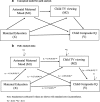Television viewing and child cognition in a longitudinal birth cohort in Singapore: the role of maternal factors
- PMID: 31419962
- PMCID: PMC6696668
- DOI: 10.1186/s12887-019-1651-z
Television viewing and child cognition in a longitudinal birth cohort in Singapore: the role of maternal factors
Abstract
Background: Although infant media exposure has received attention for its implications on child development, upstream risk factors contributing to media exposure have rarely been explored. The study aim was to examine the relationship between maternal risk factors, infant television (TV) viewing, and later child cognition.
Methods: We used a prospective population-based birth cohort study, Growing Up in Singapore Towards healthy Outcomes (GUSTO), with 1247 pregnant mothers recruited in their first trimester. We first explored the relationship of infant TV exposure at 12 months and the composite IQ score at 4.5 years, as measured by the Kaufman Brief Intelligence Test, Second Edition (KBIT-2). Multivariable linear regressions were adjusted for maternal education, maternal mental health, child variables, birth parameters, and other relevant confounders. We then examined the associations of maternal risk factors with the amount of daily TV viewing of 12-month-old infants. Path analysis followed, to test a conceptual model designed a priori to test our hypotheses.
Results: The average amount of TV viewing at 12 months was 2.0 h/day (SD 1.9). TV viewing in hours per day was a significant exposure variable for composite IQ (ß = - 1.55; 95% CI: - 2.81 to - 0.28) and verbal IQ (ß = - 1.77; 95% CI: - 3.22 to - 0.32) at 4.5 years. Our path analysis demonstrated that lower maternal education and worse maternal mood (standardized ß = - 0.27 and 0.14, respectively, p < 0.01 for both variables) were both risk factors for more media exposure. This path analysis also showed that maternal mood and infant TV strongly mediated the relationship between maternal education and child cognition, with an exceptional model fit (CFI > 0.99, AIC 15249.82, RMSEA < 0.001).
Conclusion: Infant TV exposure has a negative association with later cognition. Lower maternal education and suboptimal maternal mental health are risk factors for greater television viewing. Paediatricians have a role in considering and addressing early risks that may encourage television viewing.
Keywords: Child cognition; Maternal education; Maternal mental health; Media exposure; Screen time; Television.
Conflict of interest statement
All authors do not have competing interests relevant to this article. Outside of this submitted work, Prof YS Chong, Prof LP Shek, and A/Prof SY Chan as part of the Epigen Academic Consortium, have received research funding from Abbot Nutrition, Nestec, and Danone.
Figures
References
-
- Goh SN, Teh LH, Tay WR, Anantharaman S, van Dam RM, Tan CS, et al. Sociodemographic, home environment and parental influences on total and device-specific screen viewing in children aged 2 years and below: an observational study. BMJ Open. 2016;6(1):e009113. doi: 10.1136/bmjopen-2015-009113. - DOI - PMC - PubMed
Publication types
MeSH terms
LinkOut - more resources
Full Text Sources
Miscellaneous


